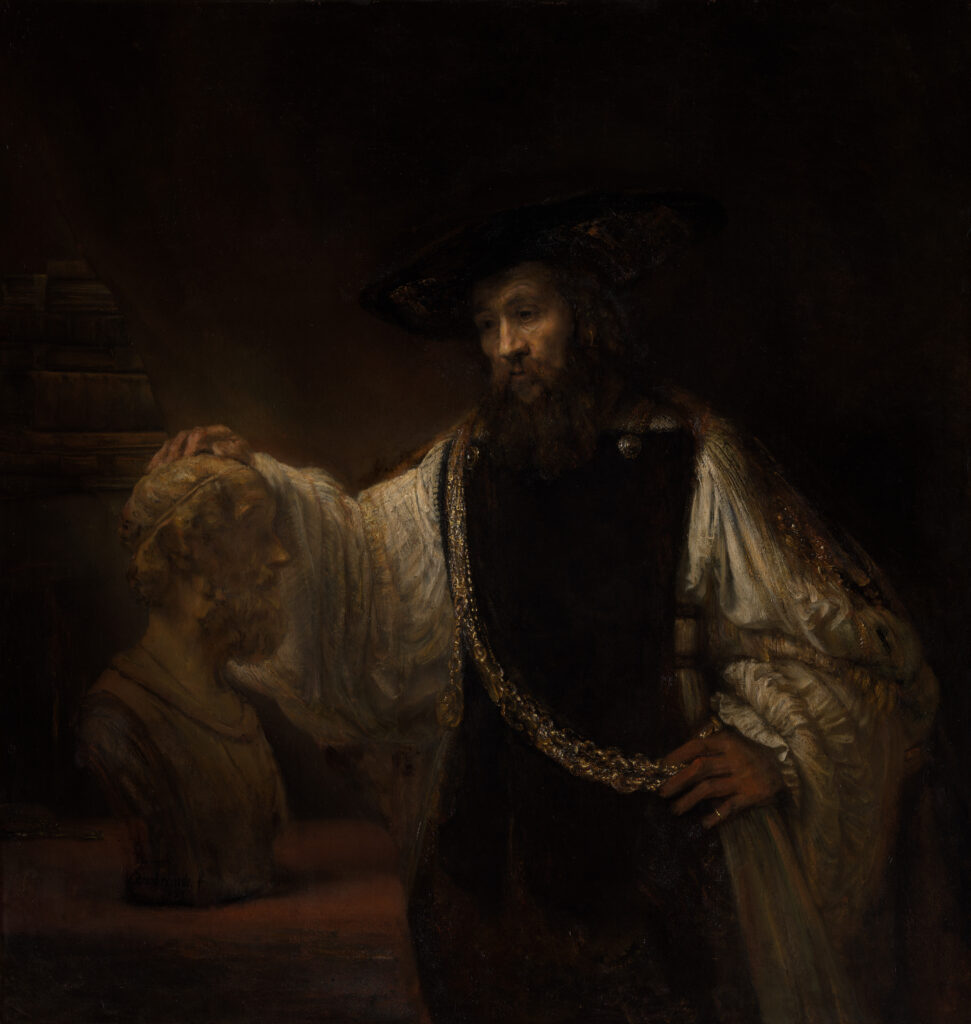Alexander, Aristotle, and Homer
"Whatever masters you defines you. "
Tweet this
In 2023, shortly after Christmas, I stood alone. Facing the mystical Dutchman Rembrandt. Shannon and the girls were already in the next gallery hall for a fashion display, but I lingered. The beloved museum nestled in Central Park, the refuge of the capital city of the world – every political capital is rendered mute by power’s financial capital. Passing through a half-dozen lesser European art galleries, I entered Rembrandt’s throne room. I stood alone with Aristotle in his thoughts in this obscure room. Rembrandt van Rijn’s 1653 painting, Aristotle with a Bust of Homer, hung by nails – while eternally enthroned – at The Met. The quality of our master will either hang or enthrone us. And Alexander knew this.
"The quality of our master will either hang or enthrone us. "
Tweet this
The greatness of Homer, Aristotle, and Alexander, on display for all the world to walk past for inspection. And a tiny sign hung-up reads ‘oil on canvas’. Sometimes the unvoiding Crown – as the emptiness of the canvas was anointed with oil like a king before its hanging – arises in the most trafficked museum in the most popular city in the world. Yet I stood there alone, in the middle of the crowded world, worshiping the obvious. A painting.
I could have touched Rembrandt’s Aristotle. His hat, once fully near-black, storked with a shade of the light under his brim. I could feel the layers dimensionally with my eyes. Those mounds of oiled paints lie entombed by the oxidized varnish darkening the work, as it cries out for purification to restore its once-known glorious colors. If that evil varnish is just removed as if it were a cataract, it would radiate the light to us all once more.
And I swear I could smell the sweat dripping down Aristotle’s arm as the most intuitive man ever, as he felt the sculpture’s flaking clay of Homer’s bust.
"If I have seen further than others, it is by standing upon the shoulders of giants. Isaac Newton"
Tweet this
Immortal Aristotle, dying in BC 322, pomply stands as he meditates on meaning and glory. Homer’s bust is there, who is likely the greatest double-dimensioned author, whose literary immortality conquered centuries prior. The Iliad and Odyssey were Homer’s works which reformulated not only minds, but forever the statecraft of Indian, Asian, Greek, Hebrew, and Roman kingdoms for centuries after he died. His impact ripples.
"The vanquished vanish while the victors rewrite history. "
Tweet this

I saw the Aristotelian gold finery ornamenting the philosopher’s clothing, portraying his greatest student, Alexander the Great. Three intertwined glories posed in Rembrandt’s work: philosophy, psychology, and power.
Alexander,
Wielding the story of Homer,
Conquers the hearts of his men,
Slaying all powers in his wake.
Homer,
Calling forth the Iphigenian epic out of the Aristotelian future,
Overcomes the imaginations of little children,
Molding philosophical ideology through timeless psychological insight.
Aristotle,
Political philosopher who bore The Greatness of Alexander,
Overbears imaginative minds to make strategic reason,
Forming wholeness from Platonic formulation.
Each man builds on the other, regardless of his order in time. So can we.
Wisdom calls forth. The inescapable dragging them into the present. Putting the past in their subjugation. “Forth!”, calls Wisdom.
It is the victors who write and rewrite history – and who call forth more from us. And none was greater than he to whom the greatest victor would bend the knee. For, as Time bends when near the Sun’s weightiness, so too the Bender eventually breaks the bent. Alexander the Great too was made by his master.
Our Humility Problem
Why are we all afraid to be mastered? Isn’t the prudent thing to entrust what we have to someone we can trust and who has more competency than ourselves? Mankind is not humble or logical, though. Instead, we are possessive, controlling, and self-serving. I am that way, anyway.
So, I wanted to understand how we can grow out of this neediness to control our finances, our philosophies, and our futures. Why do we try to hold on so tightly to these things?
Because standing there in The Met it became apparent to me that I needed to let go. To trust someone. Just like Alexander.
Three Truths of Picking a Master to Serve
Here, I offer three truths about committing your life—three considerations when bending the knee to what—or whom. Yes, you need mentors. But man also needs a master.
1. To be mastered by not only someone trustworthy but by someone competent. Competency is necessary. I want to follow someone who has really done something with their life. They do not just say they are doing something. It’s not what you say you do that makes a man – it’s what you actually do. And isn’t that what a master is – competent truth which is already proven?
"And isn’t that what a master is – competent truth already proven? "
Tweet this
2. The wisdom of the world is contained in the past. And that’s only logical since more time has passed than the present can contain. And if I am going to submit my work and my life to someone else – someone who is more competent – then I want that person to be stronger, wiser, and more noble than me. I must look up to see what is higher.
"We must look back so we can aim higher."
Tweet this
3. And once we find that potential master – his trustworthy competence and higher wisdom – we must submit to his teaching. We must become the student. We must realize that submitting is the only way for us to master anything else in life. Mastery only comes from masters.
"For mastery only comes from masters."
Tweet this
And so we need to decide not only what to be mastered by – like a love or a worthy enemy. But, the greater question, in the end, may actually be about to whom shall we receive mastery.
In the end, your life will be valued by two things:
A. Who you served. Someone needs your help, and the best someone can never repay you.
B. Who, if you served well, allowed you to obtain the mastery necessary to lift up that first needy person who could never repay you.
And if it is evil in your eyes to serve the Lord, choose this day whom you will serve, whether the gods your fathers served in the region beyond the River, or the gods of the Amorites in whose land you dwell. But as for me and my house, we will serve the Lord. – Joshua 24 (ESV)


